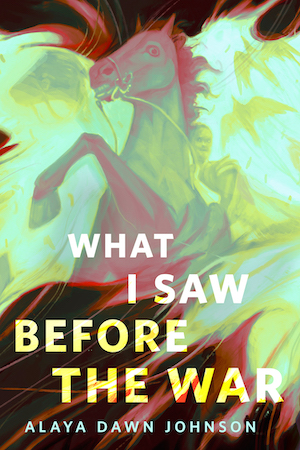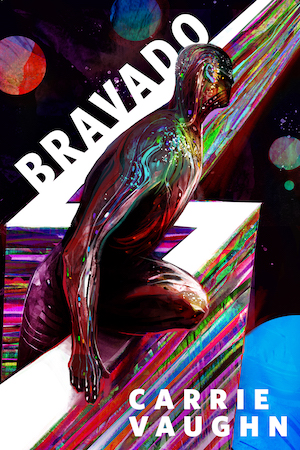Welcome to Genre in the Mainstream, a weekly Tor.com column highlighting mainstream literary writers whose work may contain elements of science fiction, fantasy or horror. In most weeks, I’ll usually have a disclaimer stating that we’re not necessarily claiming these authors for the SFF camps, and if you like those genres that you’ll probably like these books too. This week, however, I’ve decided to discuss the grandaddy of all genre defiers: Kurt Vonnegut. And though his work contains time travel, aliens, mind control, fictional chemicals, alternate histories, an exploration of the far future and so on, the question persists; can Science Fiction truly claim him?
In a collection of mostly essays and speeches titled Wampeters, Foma and Granfalloons, Vonnegut starts off with piece titled plainly: “Science Fiction.” This doesn’t pretend to be any kind of objective assessment of the genre, but rather a statement from Vonnegut about where he sits on the matter. He asserts that he was labeled as a science fiction writer early in his career because he “noticed technology.” Later, he goes on say that the genre of science fiction exists because the people writing science fiction would like to keep it that way. Vonnegut doesn’t imply that there is anything sinister about this, but rather, that just like any other club, it’s hard to pinpoint exactly how or why it got started and separated from everything else.
So if Vonnegut casually shrugged off the science fiction label, what about how the professional world views him? He was nominated for the Hugo three times: in 1960 for The Sirens of Titan, in 1964 for Cat’s Cradle, and in 1970 for Slaughterhouse-Five. None of the novels won, though they each faced pretty fierce completion (Sirens was up against Walter Miller’s A Canticle for Leibowitz while Slaughterhouse was dealing with Ursula Le Guin’s The Left Hand of Darkness.) Even so, the fact that Vonnegut was nominated should indicate that he was science fiction enough for the Hugos to notice. But, if you look down a list of past Hugo nominees, Vonnegut sticks out in a big way. Other than J.K. Rowling, he appears to be the only nominated author who wouldn’t be shelved in the science fiction and fantasy section of a bookstore or library. Why Vonnegut and not Margret Atwood? Or more recently, why not Gary Shteyngart’s Super Sad True Love Story?
At the start of his career, despite what he may have felt, he kind of was a science fiction writer, and not in the hyperbolic way he would utilize genre trappings later. His first novel, Player Piano doesn’t contain the famous Vonnegut satirical wit or hit-you-over-the-head preposterous science fiction ideas. Instead, the dystopic society is dark and depressing and Vonnegut plays everything pretty straight. The novel was even published under an alternate more SF sounding title Utopia 14. Either way, Vonnegut’s first novel is his least stylized. It’s also not very good. The slick prose of his later books isn’t fully developed, nor is his ability to use black humor to both frighten and comfort the reader at the same time. Most interestingly, the science fiction of this novel doesn’t come across as compelling as his later concepts. In Player Piano, Vonnegut was more concerned with convincing the reader that this world existed. By the time he wrote his second novel, this sensibility apparently went out the window. The flying saucers in The Sirens of Titan have one primary way in which they are controlled: an “on” button.
And what about the writing itself? Surely that’s all that’s needed to settle the matter. If enough of Kurt Vonnegut’s novels have science fiction in them, then Kurt Vonnegut is a science fiction writer. Right? Slaughterhouse-Five contains time travel and aliens. The Sirens of Titan features a Martian invasion made up of humans, mind control, and a robot alien. Cat’s Cradle depicts a fictional substance known as ice-9, which has incredibly destructive capabilities. Galapagos tells the story of how human beings eventually evolve into a furry kind of quasi-aquatic creature. However, there’s science fiction and then there’s science fiction. Muppets in Space may have a space ship in it, but no one is super concerned about what genre it belongs in. The test ought to be that if the science fiction elements are removed and the story ceases to function, it’s probably science fiction. With Vonnegut, this works for nearly all of his books except, oddly, for the most famous novel.
 Slaughterhouse-Five begins with the conceit that Billy Pilgrim has been unstuck in time and we will get to learn the story of his life out of any kind of chronological order or consideration for what he now knows. By having Billy un-stuck in time, Vonnegut can incorporate the character’s present-day opinions into past-life events. However, much of past-tense writing is already like this, particularly memoir writing. Narrators are frequently viewing things with a somewhat “long lens” and insinuating their current viewpoints onto their past selves. In this way, many writers are “unstuck in time.” Further, Vonnegut uses the almost exact same fictional biography format in his 1987 novel Bluebeard. In this one, the narrator simply skips around in time because he’s writing a biography about his life. No actual time travel is needed, and the result ends up being the same. Does this make Bluebeard a better book than Slaughterhouse-Five? Not really. It’s also important to remember that Slaughterhouse-Five does have aliens in it too.
Slaughterhouse-Five begins with the conceit that Billy Pilgrim has been unstuck in time and we will get to learn the story of his life out of any kind of chronological order or consideration for what he now knows. By having Billy un-stuck in time, Vonnegut can incorporate the character’s present-day opinions into past-life events. However, much of past-tense writing is already like this, particularly memoir writing. Narrators are frequently viewing things with a somewhat “long lens” and insinuating their current viewpoints onto their past selves. In this way, many writers are “unstuck in time.” Further, Vonnegut uses the almost exact same fictional biography format in his 1987 novel Bluebeard. In this one, the narrator simply skips around in time because he’s writing a biography about his life. No actual time travel is needed, and the result ends up being the same. Does this make Bluebeard a better book than Slaughterhouse-Five? Not really. It’s also important to remember that Slaughterhouse-Five does have aliens in it too.
It seems what prevents Vonnegut from truly being embraced by hardcore science fiction fans is his tendency to use SF as a blunt instrument. Vonnegut doesn’t want to do any world-building, or have you marvel at any technology, or really ask you to meditate on a cool science fiction idea for very long. He wants to cut right to the human drama, and if he needs flying saucers to do it, he will. Vonnegut’s aliens and flying saucers and robots don’t exist in the imagination the same way Asimov’s robots or aliens do. Vonnegut’s characters and science fiction ideas exist on the page to get the reader to feel something. He admits this outright in Breakfast of Champions by literally having Kurt Vonnegut himself become a character who is controlling the story by the end.
Does this cheapen his novels? Is Vonnegut too meta? The answer is no. Vonnegut is one of the most highly readable, engaging and truly emotionally honest writers of all time. And he got there with a love of science fiction. Even if his books never migrate off the shelves of literary fiction, Vonnegut should forever and always be viewed as one of the genre’s greatest friends and supporters. If there ever were an ambassador between the mainstream and the genre, I would choose Kurt.
Ryan Britt is a staff writer for Tor.com. He has read every single Vonnegut book except for Hocus Pocus,which he is saving.










I think Chabon fits that category too, doesn’t he?
For some reason, I always thought that Rushdie had been nominated once, but I guess I was wrong. (Also vaguely thought the same about Eco.) So I guess that Chabon is the only challenger to that unique status for Vonnegut, then.
Of course, I’ve never found a canonical list of declined Hugo nominations, so can’t really know who the electorate wanted to pick but could not…
@1: Yeah, definitely. My local indie bookstore (Bookshop Santa Cruz) shelves The Yiddish Policemen’s Union in the “Fiction” section. So I guess Chabon would be part of that category, at least by Bookshop Santa Cruz’s standards.
(Of course, then there’s the bizarrely stupid way my University bookstore handles fiction. All of Gaiman’s stuff in the litfic section, the Great Book of Amber in the Mystery and Thriller section (???), right next to a whole bunch of manga (again, right in the Mystery and Thriller section– I swear, 90% of that shelf is just SFF overflow… there’s, like, two Dan Brown books and that’s it for the Mystery and Thrills), and– I am not making this up– The Dark Knight Returns in the children’s section. I swear, Bay Tree Bookstore, you deserve a serious smacking. Bleh. Okay, rant over.)
Love Vonnegut massively, and loved him even more in high school. But I don’t think I ever thought of reading his books as reading science fiction (which I did also read at the time, of course). And it’s pretty clear that “sense of wonder” was never what he was going for with the sci-fi elements; as you say in that second-to-last paragraph, those elements don’t really have much “imaginary reality” or whatever we’d want to call it. The elements do increase the stakes, I think, and let him paint his dramas in brighter colors.
Re: the brief Shteyengart comment, I’d guess that Super Sad True Love Story would have had a chance at the ballot if it were an amazing book for more people, rather than a “pretty good” one–I actually got bored of it halfway through and set it down, and have heard similar from a few other folks. Can’t explain the complete lack of any Atwood nominations, though.
I think this is the key. I haven’t yet found anything that he wrote that even remotely attempts to come across as an “objective assessment”. I would posit that his worldview is diametrically opposed to that, given that each story tends to weave itself back and forwards along a timeline, examining the key points that total a particular person(s) experiences. From that standpoint, he’s entirely about subjectivity, and it’s very much on purpose.
Which is refreshing to me, as there are plenty of authors out there that will smack you in the face with their philosophy, with a thin veneer of story layered on it. Other authors will leave anything thought-provoking out completely, and leave the story/idea to take you beginning to end as nothing more than an escape. Vonnegut can and does point out his primary arguments throughout his stories, but they’re continually presented in a tongue-in-cheek manner. He knows that his viewpoint is important, as he’s the writer, but isn’t at all more important when compared to anyone else’s.
Lampooning his own alter-egos, including the sci-fi one, over the course of his collected works garners him a gold star from me, even more so than his meta-moments in Breakfast of Champions.
As for being Sci-Fi in general: aye. 100%, whether he likes it or not doesn’t much compute. You could take Ice-9 out of Cat’s Cradle and substitute in more of the pseduo-religion and coincidental ka-tet (whew, crossing the stream making that reference) moments, but c’mon: the Ice-9 is the reason that story works. I mean, I haven’t yet run across a scarier end-of-the-world yet, and it relies only on the fallability of humanity, of which I see it happening on a much smaller scale every day. One backwater dictator later: it’s all over.
@@@@@ Mike G. Good call. Oversight on my part! Big one.
@JStarr. You know, I think the ending of Super Sad True Love Story redeems any problems you might have had with it. But that’s just my opinion! :-)
@thomstel I agree totally. One of the reasons I love Vonnegut so much is his ability to make fun of himself in a perfectly honest manner, that doesn’t feel like a writing trick.
Vonnegutians! Check out my blog, “Writing Kurt Vonnegut” at http://www.writingkurtvonnegut.com.
Charles J. Shields
And So It Goes: Kurt Vonnegut, A Life (Holt, November 2011)
In late H.S., I was assigned to write an essay on Vonnegut by a very wise teacher. He knew I read a lot of SFF and figured Vonnegut would gently nudge me out of the strictly SFF stacks toward other capital “L” Literature. It did. Happily.